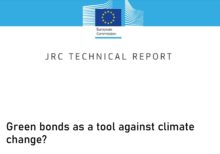Green bond financing is proving effective in promoting more sustainable, less carbon-intensive activities in the EU, according to JRC research.
Analysis of the carbon emissions of green bond issuers’ assets finds an average reduction of around 4% compared to similar non-green bond issuers. When looking specifically at new green investment projects (by excluding refinancing), the reduction is over 8%.
These findings are highlighted in a ‘science for policy’ brief released by the JRC. The brief summarises the latest JRC research in this area, including a report on green bond pricing.
In general, the ‘green’ label per se is not enough to obtain cheaper funding overall, especially when taking into account the extra costs for things like reporting or external review. However, the report authors find that green bonds issued by non-financial corporations and supranational institutions on average pay a lower yield compared to similar conventional bonds. This fact implies a lower cost of finance.
This can act as a market incentive for green bonds, but it also entails the risk of companies engaging in ‘greenwashing’- spinning their activities as being environmentally friendly, when in reality, they are not actively engaged in making their actions more sustainable. Nevertheless, the evidence of a real difference in the carbon emissions of activities funded by green vs. conventional bonds suggests that green bonds are a credible signal of firms’ climate-related engagement.
The JRC experts recommend further standardisation of market practices with more stringent requirements and incentives for external review, both to help alleviate concerns about greenwashing and to enhance the comparability and credibility of the green bond market.
In this area, the European Commission is developing a proposal for an EU Green Bond Standard. Inspired by market best practices, it aims to enhance the transparency, comparability and credibility of the green bond market for both borrowers and investors.
It will also be closely aligned with the EU taxonomy for sustainable activities, which will provide appropriate definitions to companies, investors and policymakers on which economic activities can be considered environmentally sustainable. The taxonomy will provide these concrete definitions for several different environmental areas over the coming years and is required to make the EU Green Bond Standard operational.
Background
Green bonds can play an increasingly important role in scaling up financing of private and public investment for the low carbon transition and broader environmental action in the context of the post-pandemic recovery. The European Commission intends to raise 30% of the €750 billion to be borrowed under NextGenerationEU, the instrument to help Europe recover from the pandemic, through green bonds.
This is expected to significantly impact the green bond market, by responding to investors’ interest and encouraging more issuers to proceed with green bonds. The EU intends to start issuing green bonds as soon as possible this year in order to provide strong support to the recovery effort and the green transition.
The Commission is currently working on the best way to take this forward, taking into account the fact that the EU Green Bond Standard will not be in force by the time when the green bonds will need to be issued to finance NextGenerationEU.
Green bonds also form one of the key pillars of a new strategy proposed by the Commission to stimulate the openness, strength and resilience of the EU’s economic and financial system. In this context, the Commission will work to promote the use of green bonds as tools for the financing of energy investments necessary to reach the 2030 energy and climate targets.
The European Green Deal underlines the need to direct financial and capital flows to green investments. In the framework of the European Green Deal, the Commission announced a renewed sustainable finance strategy, which aims to provide the policy tools to ensure that financial system genuinely supports the transition of businesses towards sustainability in a context of recovery from the impact of the coronavirus pandemic.
The renewed strategy will contribute to the objectives of the European green deal investment plan, in particular to creating an enabling framework for private investors and the public sector to facilitate sustainable investments. It will build on previous initiatives and reports, such as the Commission’s 2018 action plan on financing sustainable growth and the reports of the Technical Expert Group on Sustainable Finance (TEG).




